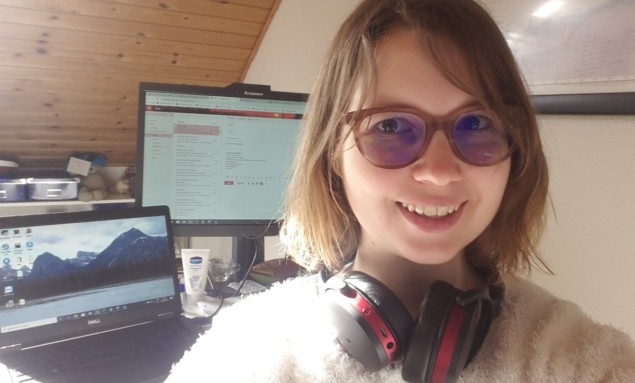Laura Patricia Kaplan is a PhD student at the Department of Oncology at Aarhus University and the Danish Center for Particle Therapy in Aarhus, Denmark.
This post is part of a series on how the COVID-19 pandemic is affecting the personal and professional lives of physicists around the world. If you’d like to share your own perspective, please contact us at pwld@ioppublishing.org.

Usually I ride my bike to work. From my front door to my office at the Danish Centre for Particle Therapy it takes me about ten minutes. These days I walk. The trip can take anywhere from five to thirty minutes and it takes me from my front door and back to my front door.
A friend and fellow PhD student told me about this habit in one of our recent “I can’t believe this is real” phone conversations. It’s supposed to be a way of separating at-work time from at-home time when your workplace is in your home. Ever since the Danish state mandated that all non-essential public employees must work from home, my workplace has become a little desk about a metre away from my bed. And while I am happy to stay home and keep from inadvertently spreading this scary new virus to all the doctors, nurses, radiation therapists and – most importantly – cancer patients I normally share the building with, this situation takes some getting used to.
Routines are important when every day could easily become a lazy Sunday at home. So I get up at 6:30, shower, have breakfast, walk to work, make coffee, go sit at my desk, and log on to my research group’s newly established office chat. In the afternoon I walk home from work, and in theory the desk should be off-limits for the remainder of the day. This doesn’t always work out, but that’s not really a new issue. Even in pre-coronavirus times I often took my work home with me in the evenings. Any PhD student will understand: You just need this last bit of code to run, to fine-polish this last figure, to rehearse your presentation for tomorrow one last time. In that way not much has changed.
I am one of the fortunate ones. My work does not demand that I be in a laboratory and perform experiments. I only need my computer and access to the right drives and databases. My biggest problem was getting permission to establish a VPN connection to our hospital systems (not as simple as one should think).

Physics in the pandemic: ‘Work will always be there’
I have friends who were forced to shut down experiments and postpone critical work, though. The shutdown of all Danish universities was announced on a Wednesday evening around seven. That evening, the friend I mentioned earlier stayed at her lab until two in the morning, feverishly collecting data so she would have enough to keep her occupied for at least a few weeks’ worth of forced home office work.
I guess in the end all I can say is that, for me personally, it could really have been much worse. Yes, a few conferences were postponed, as was my planned six months’ research stay abroad in the Netherlands. But I can still do my work, my PhD probably won’t have to be extended, and I guess I can use the quiet and isolation to finally get around to writing up that paper I’ve been meaning to get around to for the last few months… In any disaster it’s important to look for the silver lining. Stay safe out there (hopefully at home, if you can)!



